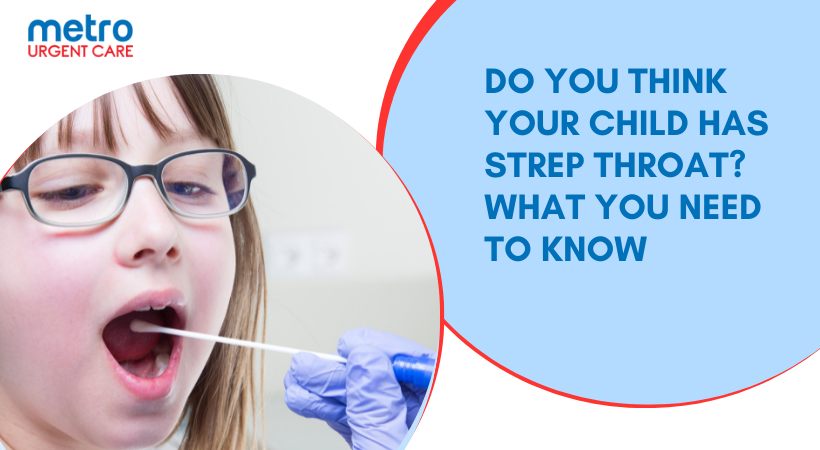


Strep throat is a contagious bacterial infection that causes pain and inflammation in the throat. It affects people of all ages, but children are more likely to get strep throat. Though strep throat is not life-threatening, leaving it untreated can cause complications, such as scarlet fever, kidney disease, sinus infections, rheumatic fever, ear infections, and post-streptococcal reactive arthritis.
Knowing its causes, symptoms, and risk factors will help you treat it on time. Continue reading to learn more.
Strep throat is caused by group A streptococcus bacteria, which live in your throat and nose. Infected people can spread the bacteria to others by sneezing, coughing, talking, and sharing utensils.
The infected person won’t develop any symptoms immediately after they contract the bacteria. It will take 2-5 days after initial exposure to begin experiencing symptoms. However, some people don’t develop any symptoms at all. Compared to asymptomatic people, those experiencing symptoms of strep throat can easily spread the infection.
Signs of strep throat are:
Strep throat is more common in children between 5 and 15 years old, while it is rare in children younger than 3 years. It easily spreads when children are in close contact spaces, such as schools and daycare centers.
Adults who are at increased risk of being infected with strep throat include:
Your doctor will review your symptoms and conduct a physical exam. If they suspect strep throat, they will perform a rapid strep test. This test includes swabbing the throat and testing the swab sample for the presence of strep A bacteria. If the test is positive, your doctor will prescribe antibiotics.
Your doctor may order a throat culture if the swab test is negative, but they will still suspect strep throat. This test involves rubbing the sterile swab on the back of the throat and tonsils and culturing the swab sample in the laboratory. Though it can take 2-3 days, a throat culture can detect the presence of bacteria that a rapid swab test misses.
A sore throat (causing pain, scratchiness, or irritation in the throat) develops gradually, while strep throat often develops suddenly and severely. If you have strep throat, your throat may appear bright red with white or yellow patches and you may have a high fever (above 101 degrees) and swollen lymph nodes and tonsils. A sore throat won’t cause such symptoms.
The following conditions can cause a sore throat:
Strep throat treatment regimen usually includes antibiotics, such as penicillin and amoxicillin. Your doctor may also advise you to practice good hygiene to avoid infecting others, which includes:
You may be able to return to normal activities after 24 hours of treatment (taking antibiotics). Also, you should start feeling better after a couple of days of beginning treatment for strep throat. Otherwise, schedule an appointment with your doctor.
Strep throat is painful and highly contagious, but it does not often require an ER visit. However, some patients who develop serious and complicated symptoms should seek medical intervention at an urgent care to prevent further aggravation of the condition.
Visit our urgent care facility for a sore throat if you or your child develops the following signs:
Visit our urgent care if you are experiencing the following symptoms of strep throat:
If you are looking for pediatric urgent care near you to treat your child’s strep throat, contact us today at Metro Urgent Care. Our pediatric healthcare providers will offer personalized treatment and medical assistance to restore your child’s health while preventing further complications.